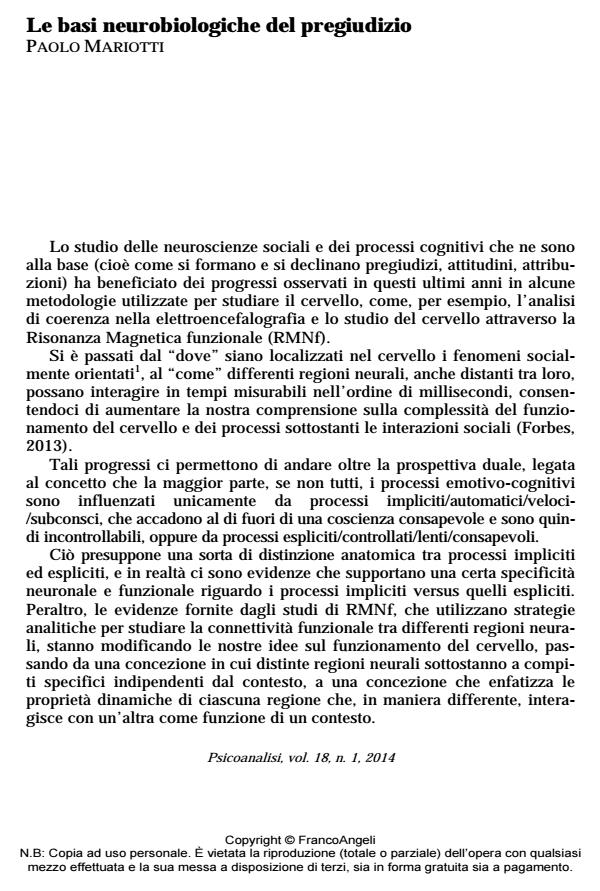Le basi neurobiologiche del pregiudizio
Titolo Rivista PSICOANALISI
Autori/Curatori Paolo Mariotti
Anno di pubblicazione 2014 Fascicolo 2014/1 Lingua Italiano
Numero pagine 8 P. 49-56 Dimensione file 53 KB
DOI 10.3280/PSI2014-001005
Il DOI è il codice a barre della proprietà intellettuale: per saperne di più
clicca qui
Qui sotto puoi vedere in anteprima la prima pagina di questo articolo.
Se questo articolo ti interessa, lo puoi acquistare (e scaricare in formato pdf) seguendo le facili indicazioni per acquistare il download credit. Acquista Download Credits per scaricare questo Articolo in formato PDF

FrancoAngeli è membro della Publishers International Linking Association, Inc (PILA)associazione indipendente e non profit per facilitare (attraverso i servizi tecnologici implementati da CrossRef.org) l’accesso degli studiosi ai contenuti digitali nelle pubblicazioni professionali e scientifiche
- Amodio D. M., Lieberman M. D. (2009). Pictures in our heads: Contributions of fMRI to the study of prejudice and stereotyping. In: Nelson T, ed., Handbook of prejudice, stereotyping, and discrimination. New York: Earlbaum, pp. 347-366.
- Amodio D. M. (2009). Intergroup anxiety effects on the control of racial stereotypes: A psychoneuroendocrine analysis. J. of Exp. Soc. Psychol., 45: 60-67.
- Amodio D. M., Kubota J. T., Harmon-Jones E., Devine P. G. (2006). Alternative mechanisms
- for regulating racial responses according to internal vs external cues. Soc. Cog. Affect. Neurosci., 1: 26-36. DOI: 10.1093/scan/nsl002
- Amodio, D. M. et al. (2004). Neural signals for the detection of unintentional race bias. Psychol.
- Sci., 15: 88-93.
- Beer J. S., Stallen M., Lombardo M. V., Gonsalkorale K., Cunningham W. A. et al. (2008)
- The Quadruple Process model approach to examining the neural underpinnings of prejudice. Neuroimage, 43: 775-783.
- Bijleveld E., Scheepers D., Ellemers N. (2012). The cortisol response to anticipated intergroup interactions predicts self-reported prejudice. PLoS ONE, 7 (3): e33681. DOI: 10.1371/journal.pone.0033681
- Bodenhausen G.V., Macrae C. N., Milne A. B. (Mahwah, 1998). Disregarding social stereotypes: implications for memory, judgment and behavior. In: Golding J. M., MacLeod C. M. eds., Intentional Forgetting: Interdisciplinary Approaches. Mahwah, pp. 349-368.
- Botvinick M. M., Braver T. S., Barch D. M., Carter C. S., Cohen J. D. (2001). Conflict monitoring and cognitive control. Psychol. Rev., 108: 624-652.
- Cunningham, W. A., Johnson M. K., Raye C. L., Gatenby J. C., Gore J. C., Banaji M. R. (2004). Separable neural components in the processing of black and white faces. Psychol. Sci., 15, 12: 806-813. DOI: 10.1111/j.0956-7976.2004.00760.
- Forbes C. E, Grafman J. (2013). Social neuroscience: the second phase. Front Hum. Neurosci., 6: 7-20. DOI: 10.3389/fnhum.2013.00020
- Forbes C. E., Cox C. L., Schmader T., Ryan L. (2012). Negative stereotype activation alters interaction between neural correlates of arousal, inhibition and cognitive control. Soc. Cogn. Affect. Neurosci., 7: 771-781. DOI: 10.3389/fnhum.2013.00560
- Hartley C. A., Phelps E. A. (2010). Changing fear: the neurocircuitry of emotion regulation.
- Neuropsychopharmacology, 35: 136-146. Kubota J. T., Banaji M. R., Phelps E. A. (2012). The neuroscience of race. Nat. Neurosci., 15, 940-948. doi 10.1038/nn.3136
- Olsson A., Nearing K. I., Phelps E. A. (2007). Learning fears by observing others: the neural systems of social fear transmission. Soc. Cogn. Affect. Neurosci., 2: 3-11.
- Phelps E. A., LeDoux J. E. (2005). Contributions of the amygdala to emotion processing: from animal models to human behavior. Neuron., 48: 175-187.
- Stanley D., Phelps E. A., Banaji M. R. (2008). The neural basis of implicit attitudes. Perspect. Psychol. Sci., 17: 164-170.
Paolo Mariotti, Le basi neurobiologiche del pregiudizio in "PSICOANALISI" 1/2014, pp 49-56, DOI: 10.3280/PSI2014-001005